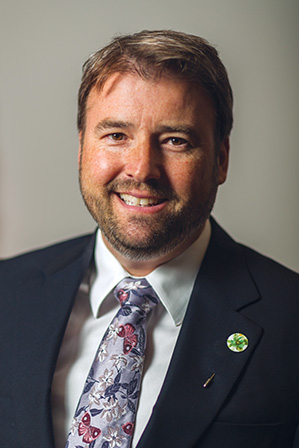It Can’t Be Easy
State VP Voice
BY KENNETH KERO-MENTZ

Being in the Foreign Service is fantastic, but it’s hard. I’m not even talking about the daily demarches, cables, meetings and taskers. I’m talking about the challenges we face today when explaining U.S. foreign or domestic policy—or even just everyday events—to an international audience, often a highly skeptical one.
When we meet with AFSA members during these chaotic times, we hear over and over again that people need open and honest discussions within offices and missions around the world about the state of State, and of our nation. I’ve spoken with many of our AFSA post reps overseas: Those who report that morale at post remains high also report that their leadership has encouraged open dialogue about the uncommon challenges facing those of us representing our great nation to the world these days.
There’s one thing about being an American abroad that’s particularly tough. No matter where you go or whom you meet, everyone already has an opinion, whether right or wrong, about the United States. That’s not necessarily the same for any other country on earth. I mean, what do most Slovakians think about Bahrain, or most Sri Lankans about Bolivia? I could be wrong, but I bet not much.
During my assignment in Brazil, locals would goad me, in a good-natured way, about Americans’ lack of global knowledge. “Americans think Brazilians speak Spanish,” they’d complain, “and they think Buenos Aires is our capital!”
It’s not easy to defend against this. But slowly, I’d begin to turn the questions around on my new friends. “I know, but the United States is so far away,” I’d smile. “So, what’s the capital of Guyana, your neighbor?” I’d ask. Blank stares. I’d follow up with “And what language do they speak in Suriname?” Sheepish grins appeared; inevitably a round of drinks would be bought as the point was made.
At the end of the day, most folks don’t know much about anything that doesn’t directly affect them.
No matter where you go or whom you meet, everyone already has an opinion, whether right or wrong, about the United States.
These days I tip my hat to my colleagues serving overseas. It can’t be easy to explain U.S. foreign policy, or our domestic situation, or our political problems. When the president refers to host countries with expletives, that can’t be easy to explain. When policies (or even leaders) change at the drop of a tweet, that can’t be easy to explain. And when our longstanding global leadership position is diminished from Washington, causing skittishness among our friends and allies around that world, that can’t be easy either.
It’s got to be tough to explain events at home. Historically we’ve spoken from a place of strength and humility, acknowledging our shortcomings but still pressing for the high road. Does that still work? How do we talk about alleged Russian meddling in our election? Sexual harassment? How about gun violence? When yet another school shooting happens, how can we explain that?
With so much chaos in our own country, how can we craft and support U.S. foreign policy, protect U.S. national security and defend American interests all over the world? Where do we focus our efforts?
As we watch many in our senior ranks depart, I have an urgent request for those of you still on the job: Lead. So many of our Career Ambassadors, Career Ministers and others in the Senior Foreign Service have left in the past 16 months. That loss is palpable. You can feel it at Main State. You can certainly feel it at our missions overseas, where many of our posts are still without their ambassadors. Coupled with everything else, it can get a guy down. But all of this can maybe—just maybe—be an opportunity for our next generation of leaders.
Lead as a mentor. Lead as a colleague. Be there and listen to what your subordinates are saying, when they’re unsure about our mission, when they’re questioning how we’ll make it through the coming months and years. The best bosses inspire, reassure and motivate. They foster dialogue and remind folks about what makes us strong. Be open and honest with your teams.
These days aren’t normal. But despite the chaos, we’ll get through this. Together, we’ll emerge stronger, but only if we support one another. We need our own Foreign Service leaders to guide us during times of change, to provide reassurance and move us forward.
And we need to look inside ourselves to be the leaders we need now.

